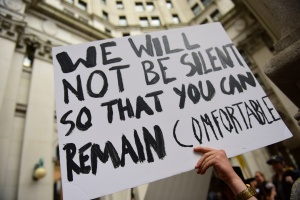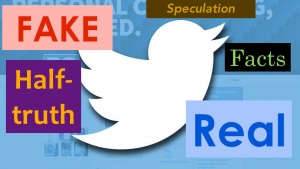Freedom of Expression
Freedom of expression is a concept that many remember from United States history and the creation of the Constitution. Our First Amendment allows the freedom of speech, press, and assembly. Along with free speech, freedom of expression can also be applied to our opinions and ideology. As technology advances, the topic around freedom of expression has evolved; what counts as free speech and what crosses the line into hate speech? The rise of social media has also brought different terms and conditions, like Twitter’s [1], to the forefront and caused controversy as to what material should be restricted or not. Freedom of expression has also been used as a loophole for cyberbullying and causes users to debate whether or not to report content.
Contents
Politics and Free Speech
Issues revolving around freedom of expression and hate speech arose during the 2016 election. The extremism of this election created a drastic polarization of both political parties in the United States. As Misha Teplitskiy and Feng Shi describe in “The Wisdom of Polarized Crowds,” people have used their freedom of expression in the form of politics even if the content is not related to political climate [2] When looking through social media platforms, specifically Facebook and Twitter, it is inevitable to not find a political argument taking place. Even if politics are uncomfortable to talk about, people have the right to post due to their right to free speech.The 2016 election is an example where extreme polarization occurred with both sides voicing their strong opinions. With the racist remarks made by Donald Trump, the question arose of what deserves to be censored or not as well as what is classified as "hate speech". The term “liberal snowflake” was born as those on the left pointed out the inappropriate comments that should not be said while Republicans stood behind this idea of freedom of expression. This brings up the controversy of what speech should be restricted versus pass as freedom of expression. There is no law or jurisdiction currently in place that legally classifies hate speech separate from free speech, thus, allowing individuals to speak in a hateful manner and remain unpunished. However, given the context of the speech, if it causes fear or harm it may be subjected to punishment. [3]
Social Media Terms & Conditions
How far can one go with free speech? Lately, alt-right groups have become more prominent on social media. Common knowledge shows that this group is connected to hate speech and tends to make inappropriate remarks centered around racism and sexism. Yet, there was still Twitter accounts up for white nationalists like David Duke [4]. Though Duke is known to spread hate speech, his right to have an account and tweet is a result of freedom of expression and he cannot be suspended unless his words go against terms and conditions. Twitter has specifically been in trouble for verifying accounts of white nationalists [5].
Facebook is also a social media platform that causes political discourse. When looking through a Facebook feed, there will more often than not be at least someone on your friend list who is posting about politics. Many of the strong political opinions are triggered by satirical websites, like the Onion [6], and biased sources, like Occupy Democrats [7]. Although these sources post exaggerations of the truth or blatant lies, they have the right to do so based on freedom of speech. Therefore, these sources will not be suspended from Facebook simply for existing, but those who end up arguing on the sources’ posts could be the ones suspended depending on how far it goes based on cyberbullying. Facebook has also been in trouble for the “fake name policy” deeming that a user can be reported for not using their legal name. This puts one’s freedom of expression on the social media platform into question. If someone has gone through a gender transition or feels resentment towards their families, for example, they will tend to change their names to feel comfortable.[8] The “real name policy” strips away the true identity of a user and ultimately their freedom of expression by allowing other users to paint their profiles rather than themselves. The argument can be made that these social media platforms pick and choose what qualifies as freedom of expression.
Ethics and Freedom of Expression
Along with being able to express ourselves, there is the possibility of false information being spread in the form of “fake news.” The rapid spread of lies online raises the concern of how ethical freedom of expression can be. Shannon Vallor implies in “Social Networking Virtues” that being truthful in what you post online affects how authentic others perceive your online persona to be. Many overexaggerate or lie about themselves on social media with the intentions of gaining popularity. [9] Honesty is connected to how we perceive each other online in relation to our authenticity. Lying on the internet has many consequences, and the credibility of words spread online comes into question with the normalization of “fake news,” affecting our outlooks on important topics like politics.
The rationale behind this can be due to the norms of online communities. Users are more likely to conform to social norms when an audience is present, causing them to be more likely to create lies and act maliciously towards others. Alain Cohn would suggest in his article "Honesty in the Digital Age" that users feel less observed and pay less attention to their actual identities. [10] Displaying one’s freedom of expression online versus in real life differs as there is not a way for one to validate another user’s identity online if they do not know the user personally.
References
- ↑ https://twitter.com/en/tos
- ↑ Teplitskiy and Shi (2018). The Wisdom of Polarized Crowds.
- ↑ “Free Speech vs. Hate Speech.” NPR, NPR, 5 June 2018, www.npr.org/2018/06/01/616085863/free-speech-vs-hate-speech.
- ↑ https://twitter.com/DrDavidDuke
- ↑ https://mashable.com/article/seth-rogen-twitter-jack-verified-white-supremacists/#MOdY1LmgqqqD
- ↑ https://www.theonion.com/
- ↑ http://occupydemocrats.com/
- ↑ Haimson, Olivia L. and Anna Lauren Hoffmann. Constructing and enforcing "authentic" identity online: Facebook, real names, and non-normative identities. 6 June 2016.
- ↑ Shannon Vallor, 11 Aug 2009, Social networking technology and the virtues
- ↑ Alain Cohn et al. Honesty in the Digital Age. Feb 2018.

